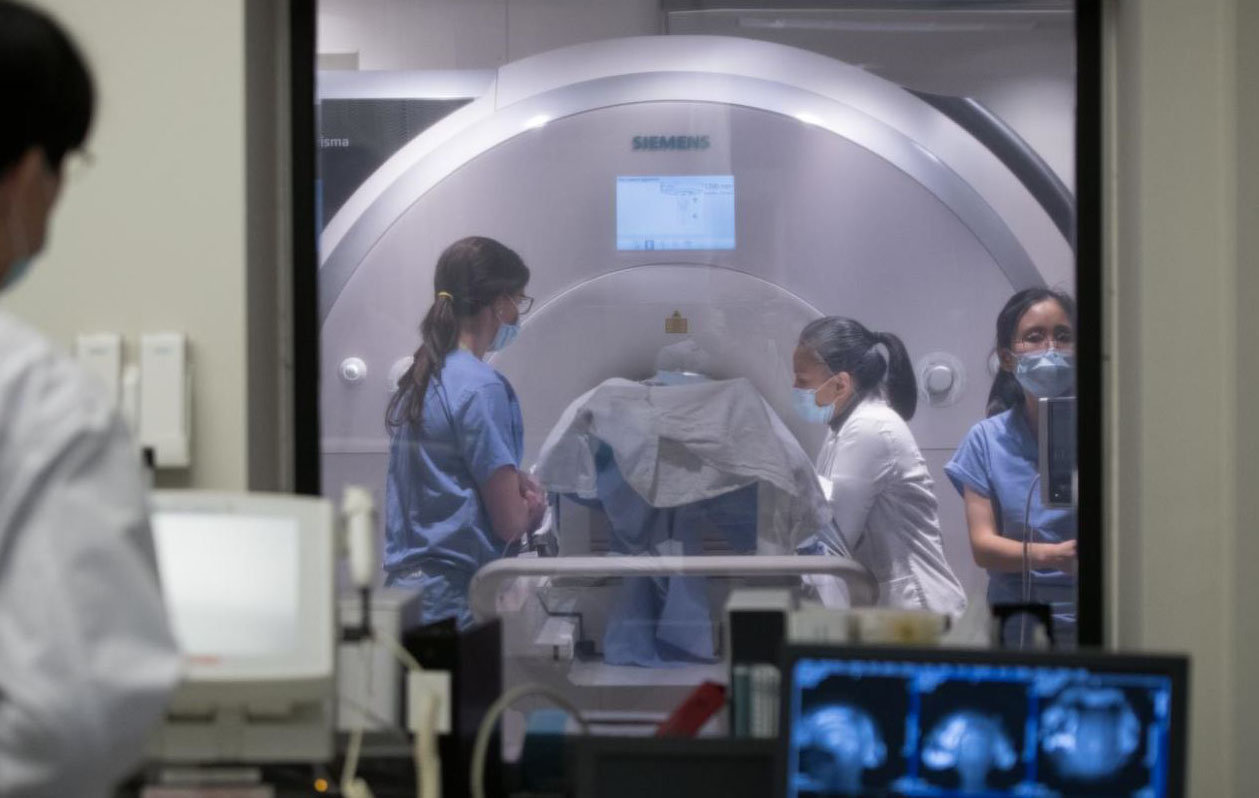First in the world: Direct-to-brain delivery of therapeutic in Parkinson’s disease using focused ultrasound is safe
A team of researchers from Sunnybrook Health Sciences Centre and University Health Network (UHN) are the first in the world to demonstrate that focused ultrasound technology can safely be used to deliver a therapeutic to targeted brain regions in patients with Parkinson’s disease (PD).
The leading-edge study has been published in Movement Disorders.
“Our early findings are an exciting and critical first step in less invasive direct-to-brain delivery of therapeutics to key areas of the brain important in the development and progression of Parkinson’s disease,” says Dr. Nir Lipsman, the study’s co-principal investigator and director of Sunnybrook’s Harquail Centre for Neuromodulation. “Current management strategies for Parkinson’s include medications and more invasive neurosurgery. Focused ultrasound is a less invasive, targeted approach that could change the way brain disorders are treated in the future.”
Low intensity MRI-guided focused ultrasound technology uses ultrasound waves to breach the blood-brain barrier, a layer of cells that protects the brain from toxins but can also block potentially helpful medications from getting where they need to go. The opening in the barrier, which closes within hours of the procedure, allows the therapy to pass and reach targeted brain region with millimeter accuracy.
Typically, treatments are unable to cross the blood-brain barrier because compounds are too large. In some cases, open brain surgery is required to help manage PD symptoms.
There is currently no cure for Parkinson’s, which is a common and progressive brain disorder that causes difficulties with movement and numerous disabling symptoms which dramatically impact a patient’s quality of life. Symptoms vary, and can progress at a different rate for each individual.
Study researchers investigated the delivery of an enzyme, glucocerebrosidase, to the putamen which is a key structure in the brain related to movement. Glucocerebrosidase may help to prevent buildup of the protein alpha-synuclein, a key indicator of PD that leads to unhealthy brain cells and neurodegeneration. In Parkinson’s, the enzyme can be defective and result in PD symptoms. Enzyme replacement therapy could be one approach to reduce or prevent neurodegeneration in PD.
The Phase I trial included four patients diagnosed with early-stage Parkinson’s disease with an average age of 54 years. Participants received three doses of the therapeutic and application of focused ultrasound every two weeks to the side of the brain most affected by the disease. They were followed for three- and six months.
“The Phase I trial offered a hint of potential improvement in symptoms following treatment but this requires further study. Any side effects, such as involuntary movements, were only temporary, and none were severe,” says Dr. Lorraine Kalia, co-principal investigator and a neurologist and senior scientist at the Krembil Brain Institute, part of UHN. “It is still very early in the research, but with our first-in-the-world study findings, we are making much needed progress in the development of innovative treatments for people with Parkinson’s disease.”
The Sunnybrook and UHN researchers have launched a Phase I/II clinical trial continuing the team’s investigation.
“The upcoming trial will further explore low intensity MRI-guided focused ultrasound and targeting enzyme replacement therapy to both sides of the brain. The ultimate goal is to improve the delivery of therapeutics to the brain with the hope of improved symptoms or slowed progression of Parkinson’s disease,“ says Dr. Suneil Kalia, co-principal investigator and a neurosurgeon and scientist at UHN.
“There is robust data in both preclinical and clinical studies demonstrating that glucocerebrosidase replacement is a promising disease-modifying therapy in Parkinson’s disease. The next step is to better understand the biologic effects of the treatment with further research,” says Dr. Ying Meng, the study’s first author and neurosurgery resident at Sunnybrook.
A key driver of Sunnybrook’s research in focused ultrasound is philanthropic investment. This study is funded by the Focused Ultrasound Foundation, The Harquail Family, and INSIGHTEC. UHN research is supported by the Krembil Foundation and UHN Foundation.
Media contacts:
Jennifer Palisoc
Communications Advisor, Sunnybrook Health Sciences Centre
jennifer.palisoc@sunnybrook.ca
Heather Sherman
Communications Manager, Krembil Brain Institute
Heather.sherman@uhn.ca
About University Health Network
University Health Network consists of Toronto General and Toronto Western Hospitals, the Princess Margaret Cancer Centre, Toronto Rehabilitation Institute, and The Michener Institute of Education at UHN. The scope of research and complexity of cases at University Health Network has made it a national and international source for discovery, education and patient care. It has the largest hospital-based research program in Canada, with major research in neurosciences, surgical innovation, cardiology, transplantation, oncology, infectious diseases, genomic medicine and rehabilitation medicine. University Health Network is a research hospital affiliated with the University of Toronto. www.uhn.ca
About Sunnybrook
Sunnybrook Health Sciences Centre is inventing the future of health care for the 1.3 million patients the hospital cares for each year through the dedication of its more than 10,000 staff and volunteers. An internationally recognized leader in research and education and a full affiliation with the University of Toronto distinguishes Sunnybrook as one of Canada’s premier academic health sciences centres. Sunnybrook specializes in caring for high-risk pregnancies, critically-ill newborns and adults, offering specialized rehabilitation and treating and preventing cancer, cardiovascular disease, neurological and psychiatric disorders, orthopaedic and arthritic conditions and traumatic injuries. The Hospital also has a unique and national leading program for the care of Canada’s war veterans. www.sunnybrook.ca





